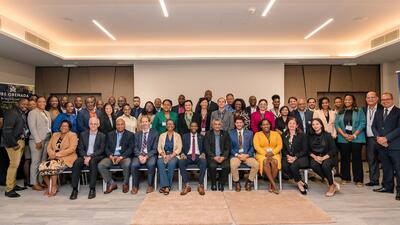Global Value Chains
With the need for countries to see job creation and the regeneration of small and medium-sized enterprises (SMEs), it is increasingly necessary for TSIs to focus on better positioning companies within global supply and production chains through capacity building and export development services. Participation in global supply chains can provide SMEs with the opportunity to increase productivity, expand their markets and attain financial stability.
In this issue of International Trade Forum, we investigate the challenges and opportunities for TSIs and the businesses they support as they integrate these supply chains.
‘A large component of building more trade capacity is understanding how trade can be integrated into development and poverty reduction strategies. For LDCs [least developed countries], this is often the first step towards identifying key constraints to overall competitiveness and to see how exports can be inserted into global supply chains in order to focus on sectors with export potential,’ said WTO Director-General Pascal Lamy.
Participation in global supply chains can provide SMEs with the opportunity to increase productivity, expand their markets and attain financial stability. In this issue of International Trade Forum, we investigate the challenges and opportunities for TSIs and the businesses they support as they integrate these supply chains.
Despite positive signs of recovery from the global trading system, trade strategies need to focus on long-term sustainable growth, rather than on short-term fixes.
It is essential to get the most value out of scarce resources – human, financial and natural.
To that point, value over volume as a means to surviving in a time of crisis was also one of the recurring themes at WEDF.
As Mr Lamy warned, trade economists and professionals should be thinking more broadly about all the ways in which cross-border exchange can create value, rather than continuing to focus on volume alone. Short-term focus on volume and profits is not sustainable in a world facing the combined crises of finance, food and climate change.
To ensure long-term sustainability and opportunities for the future, there is a need for big-picture thinking focusing on the long term. ‘The expansion of domestic consumption in emerging markets for both producer and consumer goods offers an opportunity for other developing countries to diversify their export markets through increased South-South trade,’ said Supachai Panitchpakdi, UNCTAD Secretary-General.
It is also worth noting that an estimated one-third of world trade is done firm-to-firm, not just country-to-country. With this comes a need for innovation and an open outlook to new opportunities through diversification. Globalization, aided by the rapid development in information and communication technologies, improved transport facilities and tariff reductions, has presented business opportunities for SMEs.
However, involvement in supply chains also places greater demands on the managerial and financial resources of businesses in meeting international standards and in protecting their intellectual property. To overcome these challenges, SMEs increasingly need the support of agencies such as the ITC, TSIs and their own governments.
In this issue we recognize that sustainable development must also be inclusive by bringing all people to the table. We heard this at WEDF and also at the 2010 TPO Network Conference and Awards, which was held in Mexico City in October. To this end, ITC believes that development requires mutually beneficial partnerships and collaboration across regions, between private and public sectors and within supply chains, with the support of strong TSIs and financing for enterprises to optimize efficiencies within the supply chain.








